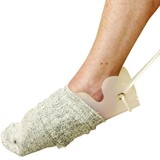The findings - published in the Annals of Internal Medicine - showed that knee-high stockings, similar to flight socks, did little to prevent deep vein thrombosis (DVT) in stroke patients. DVT is a life threatening form of blood clot that can travel up into the heart and lungs.
The CLOTS (Clots in Legs Or sTockings after Stroke) study was led by the University of Edinburgh and included more than 3000 stroke patients from 112 hospitals in nine countries.
It is by far the biggest study conducted to test the use of stockings in stroke patients.
The study questions whether the widespread use of short stockings is appropriate given the greater risk of clots associated with their use.
Professor Richard Lindley, the Australian coordinator for the study, said 60,000 people suffered from a stroke in Australia each year.
"Last year, we published our results showing that thigh length stockings didn't work to prevent DVT in patients recovering from stroke," he said.
"These new results tell us that below knee stockings are even less effective, perhaps even harmful.
"By abandoning stocking treatment, busy stroke unit nurses will have more time to perform other more beneficial tasks for patients.
"Research that tells us what treatments should be abandoned should free up resources to fund treatments that have a more robust evidence base.
"Millions of patients worldwide are fitted with stockings each year. Unless reliable evidence emerges that short stockings do actually reduce the risk of DVT, long stockings should always be used in preference."
The evidence from the CLOTS trials have already been incorporated into the new Australian Clinical Guidelines for Stroke Management issued by the National Stroke Foundation.
The Australian part of the study was supported by a grant and training from Tyco Healthcare (Covidien).
The team from Edinburgh are now testing another type of device which actively massages the legs to keep the blood moving which they hope will prevent CLOTS in stroke patients. The results from that trial are expected in about three years.


